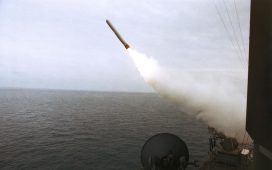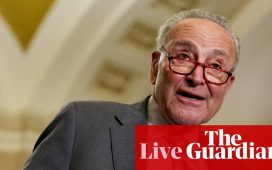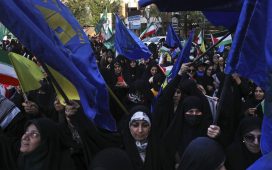American troops have fought and died in Afghanistan for two decades, and now veterans of the conflict are watching and sorting through mixed emotions as the U.S. military mission there comes to a close.
On Wednesday, President Biden announced the withdrawal of the remaining U.S. troops by Sept. 11, 2021 — 20 years to the day after the terror attacks on New York and the Pentagon that instigated America’s longest war.
While some U.S. veterans acknowledge that it may be time to exit from Afghanistan, it’s a development that doesn’t give them much comfort.
“It’s probably necessary, but I’m not a military or national security expert,” said Joe Chenelly, who served in Afghanistan in the Marine Corps and now leads the veterans organization AMVETS.
He hopes the decision to leave is based on sound military strategy and not partisan politics because of the many sacrifices that were made over the years. Over 2,400 U.S. troops died in the war and at its peak, the U.S. mission had some 100,000 troops in the country fighting the war. With no military draft and low visibility on the U.S. home front, many U.S. service men and women served multiple terms in Afghanistan as the mission evolved.
“If the administration feels those [sacrifices] were worthwhile, they should be a key message the president and his proxies deliver,” Mr. Chenelly said. “If the administration feels it was all a waste, then tell us that.”
James W. Oxford, the national commander of the American Legion, is backing the White House plan to fully withdrawal troops from Afghanistan by Sept. 11, calling it a “good start.”
“Thousands of American lives have been lost or broken fighting the global war on terrorism. An entire generation grew into adulthood without knowing a time when the United States was at peace,” he said in a statement released by the American Legion calling for ending the “Forever War.”
Mr. Oxford agreed that the U.S. had little choice but to “strike back hard” after the 9/11 attacks, but said the congressional authorization for force currently being used to keep troops in Iraq and Afghanistan has long been overtaken by events.
“We understand the value of alliances and certainly favor the elimination of imminent threats. But imminent is not the same as permanent,” he said in the statement. “It’s past time to memorialize and honor those who made sacrifices on our behalf. It’s also time to put diplomacy first.”
Mr. Biden’s decision to withdraw the troops by September 11 rather than adhere to the May 1 deadline negotiated by the Trump administration will put American troops at risks during the “high point of the fighting season” in Afghanistan, said Ron Moeller, a retired CIA paramilitary officer who served 12 tours there.
“It’s not going to send the message that I think the third-rate policymakers Biden has surrounded himself believe it will send,” Mr. Moeller said. “I think they’re being too clever.”
Instead, the Taliban and other terror groups will point to the date and say they defeated the mighty American military in 20 years.
“They’ll turn it around on us,” he said.
There are no perfect solutions to the vexing question that is Afghanistan, said Jeremy Butler, CEO of the Iraq and Afghanistan Veterans of America.
But, “there are solutions to protect and support the millions of veterans left in its wake,” Mr. Butler said.
Legislative measures like the Warfighters Act, a bill that establishes new VA benefits for veterans suffering health conditions brought on by toxic exposures, and the Hannon Act, passed into law last year to address veteran suicides, are vital to the veterans of the Afghan conflict, Mr. Butler said. He also said the U.S. has an obligation to the Afghan and Iraqi citizens who risked their lives to work with U.S. forces and now are seeking special visas to come to the U.S.
“The U.S. partnered with these brave men and women for years and we must ensure that the [special visa] program is used to its fullest potential and that we keep our promises to our allies overseas.”
The U.S. should continue offering financial and material support to Afghanistan, but the only U.S. troops in the country should be Marines assigned to the American Embassy in Kabul, Mr. Moeller argued.
He saw some positive progress during his tours in Afghanistan but a U.S. general once told him there was “no way” Afghanistan could ever be turned into something like a Jeffersonian democracy.
“The military brass throughout the 20 years have betrayed the individual soldiers by not putting forward an ‘accomplishable’ strategy to achieve the desired policy goals,” Mr. Moeller said. “With every change of leadership, we had different tactical, operational and strategic goals in mind.”
Ultimately, the U.S. backed government in Kabul must be able to stand on its own feet, Mr. Moeller said.
“We’ve given the Afghans more than enough breathing space to catch their breath, get themselves organized and fight back against the Taliban,” he said.








